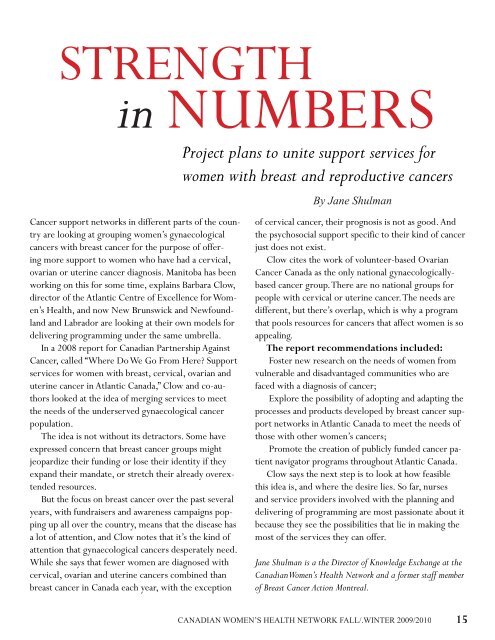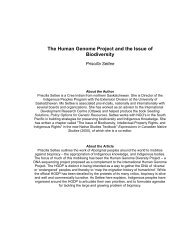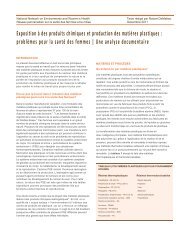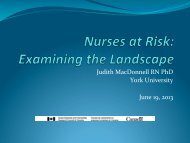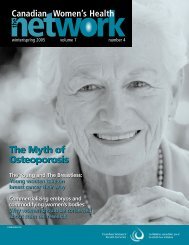Network 12-1.pdf - Canadian Women's Health Network
Network 12-1.pdf - Canadian Women's Health Network
Network 12-1.pdf - Canadian Women's Health Network
Create successful ePaper yourself
Turn your PDF publications into a flip-book with our unique Google optimized e-Paper software.
STRENGTH<br />
in NUMBERS<br />
Project plans to unite support services for<br />
women with breast and reproductive cancers<br />
By Jane Shulman<br />
Cancer support networks in different parts of the country<br />
are looking at grouping women’s gynaecological<br />
cancers with breast cancer for the purpose of offering<br />
more support to women who have had a cervical,<br />
ovarian or uterine cancer diagnosis. Manitoba has been<br />
working on this for some time, explains Barbara Clow,<br />
director of the Atlantic Centre of Excellence for Women’s<br />
<strong>Health</strong>, and now New Brunswick and Newfoundland<br />
and Labrador are looking at their own models for<br />
delivering programming under the same umbrella.<br />
In a 2008 report for <strong>Canadian</strong> Partnership Against<br />
Cancer, called “Where Do We Go From Here? Support<br />
services for women with breast, cervical, ovarian and<br />
uterine cancer in Atlantic Canada,” Clow and co-authors<br />
looked at the idea of merging services to meet<br />
the needs of the underserved gynaecological cancer<br />
population.<br />
The idea is not without its detractors. Some have<br />
expressed concern that breast cancer groups might<br />
jeopardize their funding or lose their identity if they<br />
expand their mandate, or stretch their already overextended<br />
resources.<br />
But the focus on breast cancer over the past several<br />
years, with fundraisers and awareness campaigns popping<br />
up all over the country, means that the disease has<br />
a lot of attention, and Clow notes that it’s the kind of<br />
attention that gynaecological cancers desperately need.<br />
While she says that fewer women are diagnosed with<br />
cervical, ovarian and uterine cancers combined than<br />
breast cancer in Canada each year, with the exception<br />
of cervical cancer, their prognosis is not as good. And<br />
the psychosocial support specific to their kind of cancer<br />
just does not exist.<br />
Clow cites the work of volunteer-based Ovarian<br />
Cancer Canada as the only national gynaecologicallybased<br />
cancer group. There are no national groups for<br />
people with cervical or uterine cancer. The needs are<br />
different, but there’s overlap, which is why a program<br />
that pools resources for cancers that affect women is so<br />
appealing.<br />
The report recommendations included:<br />
Foster new research on the needs of women from<br />
vulnerable and disadvantaged communities who are<br />
faced with a diagnosis of cancer;<br />
Explore the possibility of adopting and adapting the<br />
processes and products developed by breast cancer support<br />
networks in Atlantic Canada to meet the needs of<br />
those with other women’s cancers;<br />
Promote the creation of publicly funded cancer patient<br />
navigator programs throughout Atlantic Canada.<br />
Clow says the next step is to look at how feasible<br />
this idea is, and where the desire lies. So far, nurses<br />
and service providers involved with the planning and<br />
delivering of programming are most passionate about it<br />
because they see the possibilities that lie in making the<br />
most of the services they can offer.<br />
Jane Shulman is a the Director of Knowledge Exchange at the<br />
<strong>Canadian</strong> Women’s <strong>Health</strong> <strong>Network</strong> and a former staff member<br />
of Breast Cancer Action Montreal.<br />
CANADIAN WOMEN’S HEALTH NETWORK FALL/.WINTER 2009/2010 15


